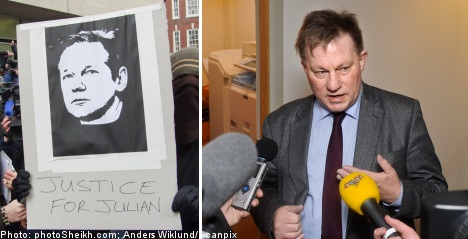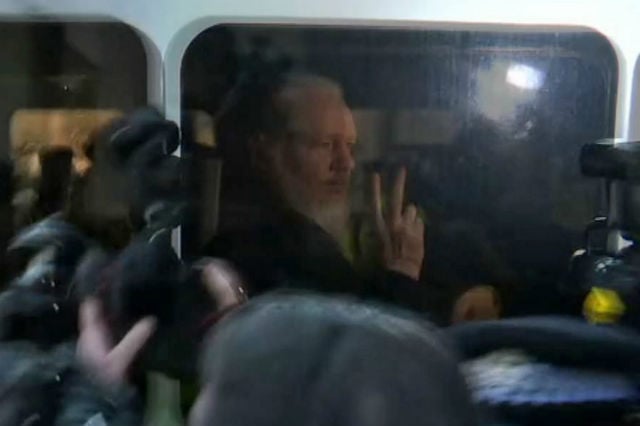“I’ve always assumed that Assange would be extradited. The regulations involved are pretty simple. European Arrest Warrants aren’t that complicated,” lawyer Claes Borgström told the Svenska Dagbladet (SvD) newspaper.
Borgström represents the two women who alleged that Assange sexually assaulted and raped them while he was visiting Sweden in August 2010.
Assange has admitted to having sex with the women, but claims it was consensual and that the accusations are politically motived.
While Borgström welcomed the decision, he was critical at how long the UK Supreme Court took to arrive at its ruling.
“I can’t understand why it’s taken so long,” he said.
Speaking with the AFP news agency, Borgström said he expects Assange will be extradited soon.
“The decision (that Assange can be extradited) was what we expected …It’s unfortunate that it has been delayed further, but he will ultimately be extradited,” he said.
“We expect an indictment fairly soon after he gets here, maybe within a month,” Borgstroem said, adding it “could be during the summer.”
Borgström has yet to discuss Wednesday’s ruling with his clients, but told SvD he believes they are relieved.
“They wish to see him held responsible for what he did. Anything else would have been horrible,” he told SvD.
Click here to read Stockholmers’ reactions to the Julian Assange ruling
Meanwhile, a legal expert hinted that, even once Assange is extradited to Sweden, it’s possible that his case might not proceed to trial.
Speaking with The Local ahead of the verdict, Chistopher Wong, a legal scholar at Lund University said that it would be hard to imagine a scenario whereby Assange didn’t end up in Sweden following the rejection of his appeal.
“This is the final decision in the legal process and the UK authorities will have no choice but to surrender him to Sweden,” said Wong.
Once in Sweden, Assange would likely be held in some sort of restricted custody, according to Wong.
“There will probably be restrictions on his movements, but he won’t necessarily be held in a jail cell,” he said.
Once Assange is back in Sweden, prosecutors can then continue their investigation into the alleged sex crimes of which Assange stands accused.
In a statement issued following the ruling, the Swedish Prosecution Authority (Åklagarmyndigheten) said that the UK court’s decision meant that “Julian Assange will be surrendered to Sweden within 10 days after a legally binding judgment”.
However, Director of Public Prosecution Marianne Ny, who is leading the Assange probe, isn’t planning to make any public comments about the case until an eventual detention hearing in Sweden, the agency added.
According to Wong, prosecutors will likely interview Assange in order to get his version of events from the August 2010 encounter which prompted the rape accusations.
Wong explained that, while remote, there is indeed a possibility that prosecutors could drop the case altogether after speaking with Assange.
“Most of the forensic evidence has already been gathered and prosecutors believe they have a strong case and enough evidence for a conviction,” he said.
“But it all depends on what Assange tells them. It is possible that he may offer up an explanation for what happened that makes the prosecutor rethink how strong a case she has. If that’s the case, then it would be her duty to not bring the case to trial.”
Many Assange supporters have questioned why prosecutors in Sweden have pursued Assange so vigorously in the absence of formal criminal charges.
But Wong explained that the criticism of the Swedish criminal justice system is unfounded and stems primarily from a simple “misunderstanding” in terminology.
“There is no formal indictment, but he is a criminal suspect and has been informed of the suspicions against him,” said Wong.
“If the same thing had happened in England, he would have been formally charged at that point and then prosecutors would have continued their investigation. But in Sweden they do things differently.”
Thus according to Wong, critics’ anger over efforts to bring Assange back to Sweden to face questioning without having been formally charged is somewhat misdirected and an “emotional reaction” to the different terminology and legal processes.
“People are simply reacting to the term, I think. Just because he’s not been charged doesn’t mean he’s not a criminal suspect and there is evidence against him,” he said.
David Landes/AFP



 Please whitelist us to continue reading.
Please whitelist us to continue reading.
Member comments